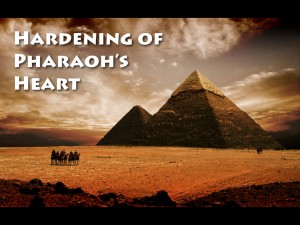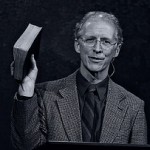 Pastor John, I have a theological question for you. What would you say to someone (who was an Arminian) if you were having a discussion with them about the sovereignty of God in salvation and they stated that God does in fact change His mind (Exodus 32:14 is an example)?
Pastor John, I have a theological question for you. What would you say to someone (who was an Arminian) if you were having a discussion with them about the sovereignty of God in salvation and they stated that God does in fact change His mind (Exodus 32:14 is an example)?
That is a very good question. Nowadays people like to have instant sound bite size answers to their questions, but that is not always possible. On this issue, it is important to lay the groundwork to provide a satisfactory, biblical answer and to do that necessitates serious study and application of the Scriptures. Let’s take a look at this question from a few different angles.
Hermeneutics is the science of biblical interpretation. One amongst many sound principles of interpretation is that we should base our view of God on the didactic (teaching) portions of scripture rather than the narrative (story) or poetic portions. This is why although the Bible says we can hide under the shadow of the Most High and under His wing find refuge, no Bible scholar expects God the Father to be a winged bird in heaven. This is obvious picture language where God uses images to speak to us highlighting the fact that just as a young bird finds refuge in the warmth and comfort of its mother’s wings, we believers can find refuge in the Lord. The Lord is our rock and fortress, but that does not mean God is a literal rock or castle; or that because the Lord is our Shepherd and the Psalmist wrote, “your rod and your staff, they comfort me” God the Father has a literal rod and shepherd’s staff that He uses with regularity in heaven. No, it is obvious picture language to describe something very meaningful about His relationship with His people, even though it is not to be viewed in wooden, literal terms.
These expressions are what we call anthropomorphic language (taken from two Greek words, “anthropos” meaning human or man and “morphos” meaning form). God communicates with us in human words or form. When you think about it, that is all God has at his disposal when revealing His truth to us because as humans we can only understand human language. Birds speak a bird language to converse with each other and so too, human beings use a human form of communication.
Likewise, when God communicates with us, He uses terms and images that are easy for us to grasp, even though if He explained them in the way He understood them, the concepts would be so far and vastly above our ability to comprehend that they would appear meaningless to us. God is infinite in knowledge and we as His creatures are finite. God has to remedy this in some way when He communicates with us so that He might provide a bridge of understanding. Just as a father smiles and engages in “baby talk” as he stands over the cot of his new born child, so God stoops to communicate with us in “baby talk” using language we can understand. Everything He communicates is true and meaningful, but expressed in terms finite minds can fathom.
All Scripture is equally inspired by God. Each passage has to be interpreted correctly and that means that even when we LITERALLY believe the Bible, we should interpret the parables as literal parables, poetry as literal poetry, the narratives as literal narratives, the historical genealogies as literal historical genealogies (rather than look for a secret hidden message) and on and on we can go.
One rule of interpretation is to build all doctrine on necessary rather than possible inferences. A necessary inference is something that is definitely taught by the text. The conclusion is unavoidable. It is necessary. A possible inference is something that could or might be true, but not something actually stated by the text. Some refer to this as the distinction between the implicit and the explicit. An implication may be drawn from the text of scripture, but we then have to ask if the implicit interpretation is a NECESSARY ONE rather than a POSSIBLE one. We can all have our theories, and we do, but a sound principle we should employ is to not teach as DOCTRINE something that is only a possible interpretation. We should build doctrine ONLY on necessary interpretation.
In practical terms, to make these kind of distinctions are often a lot harder than it might first appear because it means we have to take a step back and analyze exactly why we think a verse teaches something. In other words, it means testing our traditions and doing a lot of thinking. Yet this is something we should do constantly. Paul exhorted Timothy to “Think over what I say, for the Lord will give you understanding in everything.” (2 Tim. 2:7)
All of us should be prepared to hold up our preconceived notions to the light of Scripture to see if these assumptions are valid or not. The result of this process often involves the killing of some sacred cows, but that’s a good thing, if what we have held to be true cannot actually be supported by the biblical text. We all have our blind spots and traditions but we are not always aware of them. Therefore, the serious Bible student asks questions of himself and of the text constantly in order to determine what the sacred text actually says and then he builds his thinking on that.
Here’s one text as an example: John 20:19 says, “On the evening of that day, the first day of the week, the doors being locked where the disciples were for fear of the Jews, Jesus came and stood among them and said to them, “Peace be with you.”
Many people read this narrative passage and conclude that Jesus walked through the locked door in order to present Himself to His disciples. But does the text actually say that? No, it does not. The text might be teaching that. It is certainly a possible inference drawn from the text, but by no means a necessary one. There are other possible explanations.
Concerning this verse the ESV Study Bible says (correctly in my opinion), “Some interpreters understand the doors being locked to imply that Jesus miraculously passed through the door or the walls of the room, though the text does not explicitly say this. Since Jesus clearly had a real physical body with flesh and bones after he rose from the dead… one possibility is that the door was miraculously opened so that the physical body of Jesus could enter, which is consistent with the passage about Peter going through a locked door some time later (see Acts 12:10).”
To state the principle again: we should build all doctrine on necessary rather than possible inferences, on the explicit and not the implicit. All else is speculation.
Another rule: Interpret the unclear passages in Scripture in light of the clear. Though all Scripture is God breathed, every passage is not equally clear (easy to understand). Even the Apostle Peter struggled with Paul’s writings at times, as he found some of it “hard to understand, which the untaught and unstable distort, as they do also the rest of the Scriptures, to their own destruction.” (2 Peter 3:16)
When determining what the Bible teaches on a particular topic, find the passages which CLEARLY address the issue at hand and make this the starting point of your doctrine, rather than an obscure (or less than clear) passage. Once that which is clear is firmly grasped and understood, then proceed to study the passages which at first seem to be unclear, using the other hermeneutic rules.
In narratives, something may be implied from a story (as in the case above), but we should always ask if it is a necessary implication in the text and secondly ask if that possible interpretation is countered by something explicitly stated elsewhere in Scripture in the didactic (teaching) portions. We do this all the time naturally – which is why we dont think of God as a winged bird with feathers… why? because elsewhere (in the didactic teaching in John 4:24, God reveals Himself to be a Spirit rather than localized in one place with a physical body (He is omnipresent, etc, etc,).
This distinction I make is not mine in the way of origin. It is a carefully thought out method of interpretation employed by all sound teachers of the Bible. It is not a method of Reformed people to deny Arminians.
Of course, none of us follow our own interpretive rules consistently, which is why Christians and even scholars make mistakes, and why we dont all see things the same way. We ALL have our blind spots and traditions. Those most blinded to their traditions are those who dont believe they have any.
If there is a contradiction between two views, at least one of them is wrong.. If we could see our glaring mistakes personally, we would change our views instantly, but that is what theologians call one of the noetic effects of the Fall – we just dont think as perfectly now since the Fall of Adam… God is not confused even if we are.
When we read a biblical story, it is easy to “read into” it to interpret it in ways unintended by the author. This is why sometimes a parable only teaches one main truth and not every detail in the parable can be stretched too far.. the parable merely provides a window to reveal a certain truth – for instance, that men always ought to pray. Incorrect interpretation occurs when we view minor details in the story in the same regard as an explicit statement of doctrine. Great care is needed so that we base our belief system on what it explicitly taught by the didactic portions rather than merely perhaps implied in the narrative ones.
In reading certain narrative portions of Scripture, some have incorrectly concluded that God changes His mind. Yet the Bible is clear that not only does God not change in His essential nature (Mal. 3:6) but that He does not repent or change His mind. The Bible actually teaches this in a didactic portion. “God is not man, that he should lie, or a son of man, that he should change his mind. Has he said, and will he not do it? Or has he spoken, and will he not fulfill it?” Numbers 23:19.
For the sake of argument though, lets try to imagine God literally changing His mind. I want to explain how this concept is inseparably linked with God’s omniscience because for God to change His mind, He would need to make a decision and then be given new information He did not have before, so that He could either see the error of His ways, or choose a better course of action. It is important we see this. Continue reading →

 12 But the LORD hardened the heart of Pharaoh, and he did not listen to them, as the LORD had spoken to Moses. 13 Then the LORD said to Moses, “Rise up early in the morning and present yourself before Pharaoh and say to him, ‘Thus says the LORD, the God of the Hebrews, “Let my people go, that they may serve me. 14 For this time I will send all my plagues on you yourself, and on your servants and your people, so that you may know that there is none like me in all the earth. 15 For by now I could have put out my hand and struck you and your people with pestilence, and you would have been cut off from the earth. 16 But for this purpose I have raised you up, to show you my power, so that my name may be proclaimed in all the earth. 17 You are still exalting yourself against my people and will not let them go.
12 But the LORD hardened the heart of Pharaoh, and he did not listen to them, as the LORD had spoken to Moses. 13 Then the LORD said to Moses, “Rise up early in the morning and present yourself before Pharaoh and say to him, ‘Thus says the LORD, the God of the Hebrews, “Let my people go, that they may serve me. 14 For this time I will send all my plagues on you yourself, and on your servants and your people, so that you may know that there is none like me in all the earth. 15 For by now I could have put out my hand and struck you and your people with pestilence, and you would have been cut off from the earth. 16 But for this purpose I have raised you up, to show you my power, so that my name may be proclaimed in all the earth. 17 You are still exalting yourself against my people and will not let them go. How shall we know God? How shall we know what God is like and how we are to think about him? When I ask myself this question, one response comes crashing into my mind with overwhelming certitude: human opinion counts for nothing. What you feel about the way God should be and what I feel about the way God should be counts for nothing. If someone rises up and makes a pronouncement about what they can believe and can’t believe about God, that is as significant in determining what is true about God as the creaking of a window in the wind. Human opinion counts for nothing in defining God.
How shall we know God? How shall we know what God is like and how we are to think about him? When I ask myself this question, one response comes crashing into my mind with overwhelming certitude: human opinion counts for nothing. What you feel about the way God should be and what I feel about the way God should be counts for nothing. If someone rises up and makes a pronouncement about what they can believe and can’t believe about God, that is as significant in determining what is true about God as the creaking of a window in the wind. Human opinion counts for nothing in defining God.
 One of the most clear Bible prophecies that has already been fulfilled concerns Isaiah’s portrayal of the Suffering servant, found in Isaiah 52:13 – Isaiah 53. Written around 700 years before the time of Messiah, it is a fascinating description of One whose mission it would be to bear the sins of God’s people, be cut off from the land of the living and rise again from death.
One of the most clear Bible prophecies that has already been fulfilled concerns Isaiah’s portrayal of the Suffering servant, found in Isaiah 52:13 – Isaiah 53. Written around 700 years before the time of Messiah, it is a fascinating description of One whose mission it would be to bear the sins of God’s people, be cut off from the land of the living and rise again from death. Pastor John, I have a theological question for you. What would you say to someone (who was an Arminian) if you were having a discussion with them about the sovereignty of God in salvation and they stated that God does in fact change His mind (Exodus 32:14 is an example)?
Pastor John, I have a theological question for you. What would you say to someone (who was an Arminian) if you were having a discussion with them about the sovereignty of God in salvation and they stated that God does in fact change His mind (Exodus 32:14 is an example)?